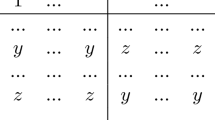Abstract
Consider an individual whose judgments are always based on a fundamental criterion such as a political ideology or a religious doctrine. In a choice situation, he always prefers any alternative that is compatible with the criterion to any that is not. When individuals are allowed to have preference spaces restricted in this manner, we investigate Arrow-consistent domains. We observe that a diversity of attitudes is essential in order to escape an Arrovian impossibility.

Similar content being viewed by others
Notes
For a set A, ∣A∣ denotes its cardinality.
This condition is restricted by the numbers of individuals and alternatives. For example, it is easy to check that when the number of individuals is two and the number of alternatives is nine, there is no dichotomous net.
It is also possible to consider the case when G 1 and G 2 intersect. However, we do not deal with this case here to simplify the discussion.
References
Arrow KJ (1963) Social choice and individual values, 2nd ed., Wiley, New York
Black D (1948) On the rationale of group decision-making. J Polit Econ 56:23–34
Fishburn PC (1976) Dictators on blocks: generalizations of social choice impossibility theorems. J Comb Theory (B) 20:153–170
Inada K (1964) A note on the simple majority decision rule. Econometrica 32:525–531
Inada K (1969) The simple majority decision rule. Econometrica 37:490–506
Kalai E, Muller E, Satterthwaite M (1979) Social welfare functions when preferences are convex, strictly monotonic, and continuous. Public Choice 34:87–97
Le Breton M, Weymark J (1996) An introduction to Arrovian social welfare functions on economic and political domains. In: Schofield N (ed) Collective decision making: social choice and political economy. Kluwer Academic Publishers, Boston, pp 25–61
Le Breton M, Weymark J (2002) Arrovian social choice theory on economic domains. In: Arrow KJ, Sen AK, Suzumura K (eds) Handbook of social choice and welfare, Vol 2. North-Holland, Amsterdam (in press)
Sen AK (1966) A possibility theorem on majority decisions. Econometrica 34:491–499
Suzumura K, Xu Y (2004) Welfarist-consequentialism, similarity of attitudes, and Arrow’s general impossibility theorem. Soc Choice Welfare 22:237–251
Author information
Authors and Affiliations
Corresponding author
Additional information
This paper received the Kanematsu Fellowship from RIEB, Kobe University in May 2002. We are much indebted to two anonymous referees of this journal, three anonymous referees of the Kanematsu Fellowship, Jun Iritani, William Thomson, and John Weymark for helpful comments. We also thank Takashi Kamihigashi, Tetsuya Kishimoto, Ryo-ichi Nagahisa, Hiroaki Nagatani, Tadashi Sekiguchi, Koji Shimomura, Tomoichi Shinotsuka, Koichi Suga, Makoto Tanaka, Ken Urai, and participants at the Kobe-Osaka Joint Seminar in Mathematical Economics at Osaka University in March 2001, the meeting of the Japanese Economic Association at Hiroshima Syudo University in May 2001, the Far Eastern Meeting of the Econometric Society in Kobe in July 2001, the Seventh Decentralization Conference at Waseda University in October 2001, the Sixth International Meeting of the Society for Social Choice and Welfare at Caltech in July 2002 for valuable suggestions. The first version was written while we were graduate students in Economics at Kobe University.
Rights and permissions
About this article
Cite this article
Sakai, T., Shimoji, M. Dichotomous preferences and the possibility of Arrovian social choice. Soc Choice Welfare 26, 435–445 (2006). https://doi.org/10.1007/s00355-005-0028-4
Received:
Accepted:
Published:
Issue Date:
DOI: https://doi.org/10.1007/s00355-005-0028-4



